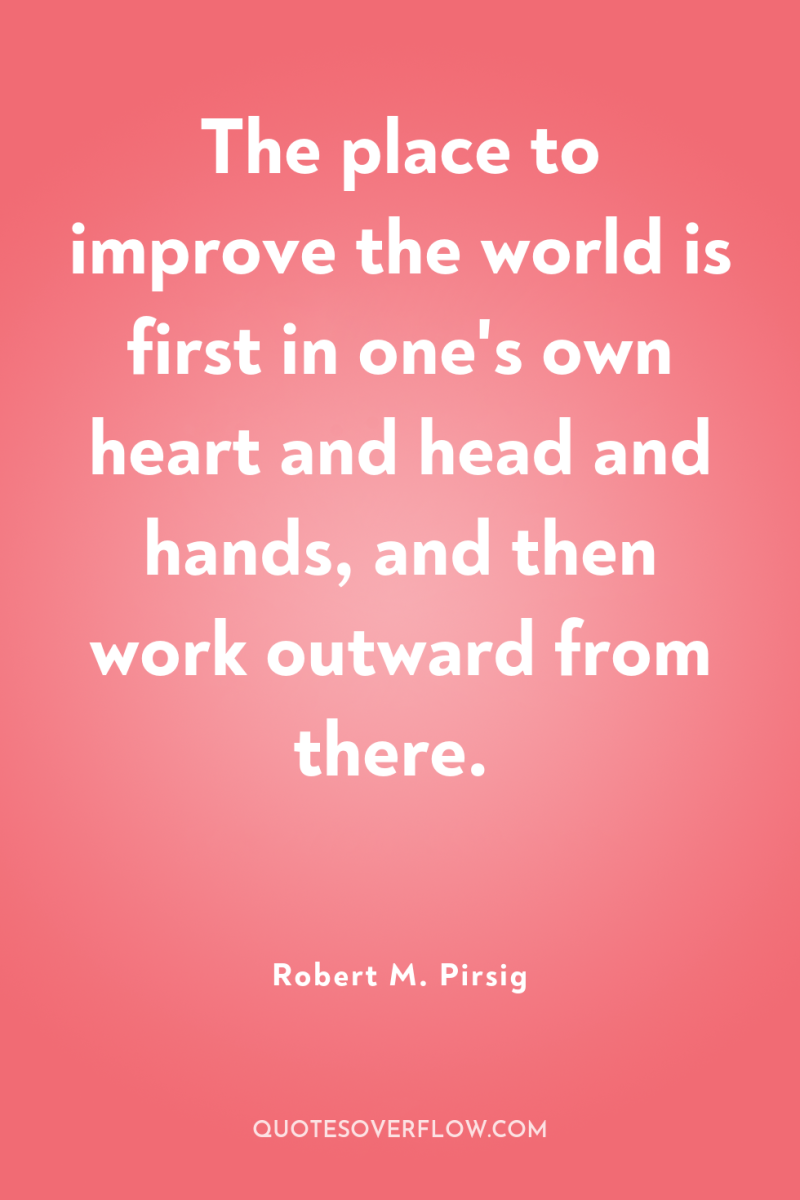
1
The place to improve the world is first in one's own heart and head and hands, and then work outward from there.Robert M. Pirsig

2
The truth knocks on the door and you say, "Go away, I'm looking for the truth, " and so it goes away. Puzzling.Robert M. Pirsig

3
In the high country of the mind one has to become adjusted to the thinner air of uncertainty...Robert M. Pirsig
4
What is in mind is a sort of Chautauqua..that's the only name I can think of for it..like the traveling tent-show Chautauquas that used to move across America, this America, the one that we are now in, an old-time series of popular talks intended to edify and entertain, improve the mind and bring culture and enlightenment to the ears and thoughts of the hearer. The Chautauquas were pushed aside by faster-paced radio, movies and TV, and it seems to me the change was not entirely an improvement. Perhaps because of these changes the stream of national consciousness moves faster now, and is broader, but it seems to run less deep. The old channels cannot contain it and in its search for new ones there seems to be growing havoc and destruction along its banks. In this Chautauqua I would like not to cut any new channels of consciousness but simply dig deeper into old ones that have become silted in with the debris of thoughts grown stale and platitudes too often repeated. "What's new?" is an interesting and broadening eternal question, but one which, if pursued exclusively, results only in an endless parade of trivia and fashion, the silt of tomorrow. I would like, instead, to be concerned with the question "What is best?, " a question which cuts deeply rather than broadly, a question whose answers tend to move the silt downstream. There are eras of human history in which the channels of thought have been too deeply cut and no change was possible, and nothing new ever happened, and "best" was a matter of dogma, but that is not the situation now. Now the stream of our common consciousness seems to be obliterating its own banks, losing its central direction and purpose, flooding the lowlands, disconnecting and isolating the highlands and to no particular purpose other than the wasteful fulfillment of its own internal momentum. Some channel deepening seems called for. .Robert M. Pirsig
6
If I hold my head to the left and look down at the handle grips and front wheel and map carrier and gas tank I get one pattern of sense data. If I move my head to the right I get another slightly different pattern of sense data. The two views are different. The angles of the planes and curves of the metal are different. The sunlight strikes them differently. If there's no logical basis for substance then there's no logical basis for concluding that what's produced these two views is the same motorcycle.Robert M. Pirsig
7
The cause of our current social crises, he would have said, is a genetic defect within the nature of reason itself. And until this genetic defect is cleared, the crises will continue. Our current modes of rationality are not moving society forward into a better world. They are taking it further and further from that better world. Since the Renaissance these modes have worked. As long as the need for food, clothing and shelter is dominant they will continue to work. But now that for huge masses of people these needs no longer overwhelm everything else, the whole structure of reason, handed down to us from ancient times, is no longer adequate. It begins to be seen for what it really is…emotionally hollow, esthetically meaningless and spiritually empty.Robert M. Pirsig
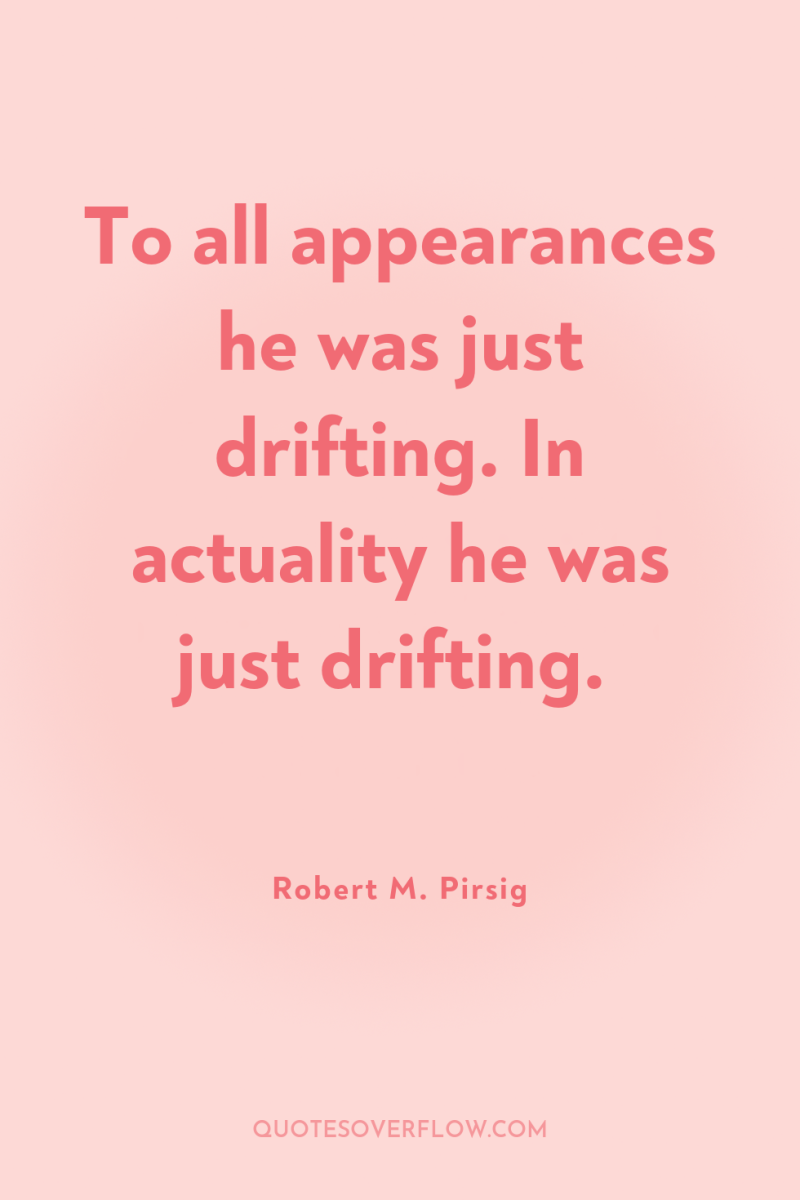
8
To all appearances he was just drifting. In actuality he was just drifting.Robert M. Pirsig
9
The primitive tribes permitted far less individual freedom than does modern society. Ancient wars were committed with far less moral justification than modern ones. A technology that produces debris can find, and is finding, ways of disposing of it without ecological upset. And the schoolbook pictures of primitive man sometimes omit some of the detractions of his primitive life - the pain, the disease, famine, the hard labor needed just to stay alive. From that agony of bare existence to modern life can be soberly described only as upward progress, and the sole agent for this progress is quite clearly reason itself.Robert M. Pirsig
10
He felt that institutions such as schools, churches, governments and political organizations of every sort all tended to direct thought for ends other than truth, for the perpetuation of their own functions, and for the control of individuals in the service of these functions. He came to see his early failure as a lucky break, an accidental escape from a trap that had been set for him, and he was very trap-wary about institutional truths for the remainder of his time.Robert M. Pirsig

11
When one person suffers from a delusion, it is called insanity. When many people suffer from a delusion it is called a Religion.Robert M. Pirsig
12
An alternative – and better – definition of reality can be found by naming some of its components: air, sunlight, wind, water, the motion of waves, the patterns of clouds before a coming storm. These elements, unlike 20th-century office routines, have been here since before life appeared on this planet, and they will continue long after office routines are gone. They are understood by everyone, not just a small segment of a highly advanced society. When considered on purely logical grounds, they are more real than the extremely transitory lifestyles of the modern civilization the depressed ones want to return to. If this is so, then it follows that those who see sailing as an escape from reality have their understanding of sailing and reality backward. Sailing is not an escape, but a return to and a confrontation of a reality from which modern civilization is itself an escape. For centuries, man suffered from the reality of an Earth that was too dark or too hot or too cold for his comfort, and to escape this he invented complex systems of lighting, heating and air conditioning. Sailing rejects these and returns to the old realities of dark and heat and cold. Modern civilization has found radio, television, movies, nightclubs and a huge variety of mechanized entertainment to titillate our senses and help us escape from the apparent boredom of the Earth and the Sun, the wind and the stars. Sailing returns to these ancient realities. .Robert M. Pirsig
13
The doctrinal differences between Hinduism and Buddhism and Taoism are not anywhere near as important as doctrinal differences among Christianity and Islam and Judaism. Holy wars are not fought over them because verbalized statements about reality are never presumed to be reality itself.Robert M. Pirsig
14
Like those in the valley behind us, most people stand in sight of the spiritual mountains all their lives and never enter them, being content to listen to others who have been there and thus avoid the hardships.Robert M. Pirsig
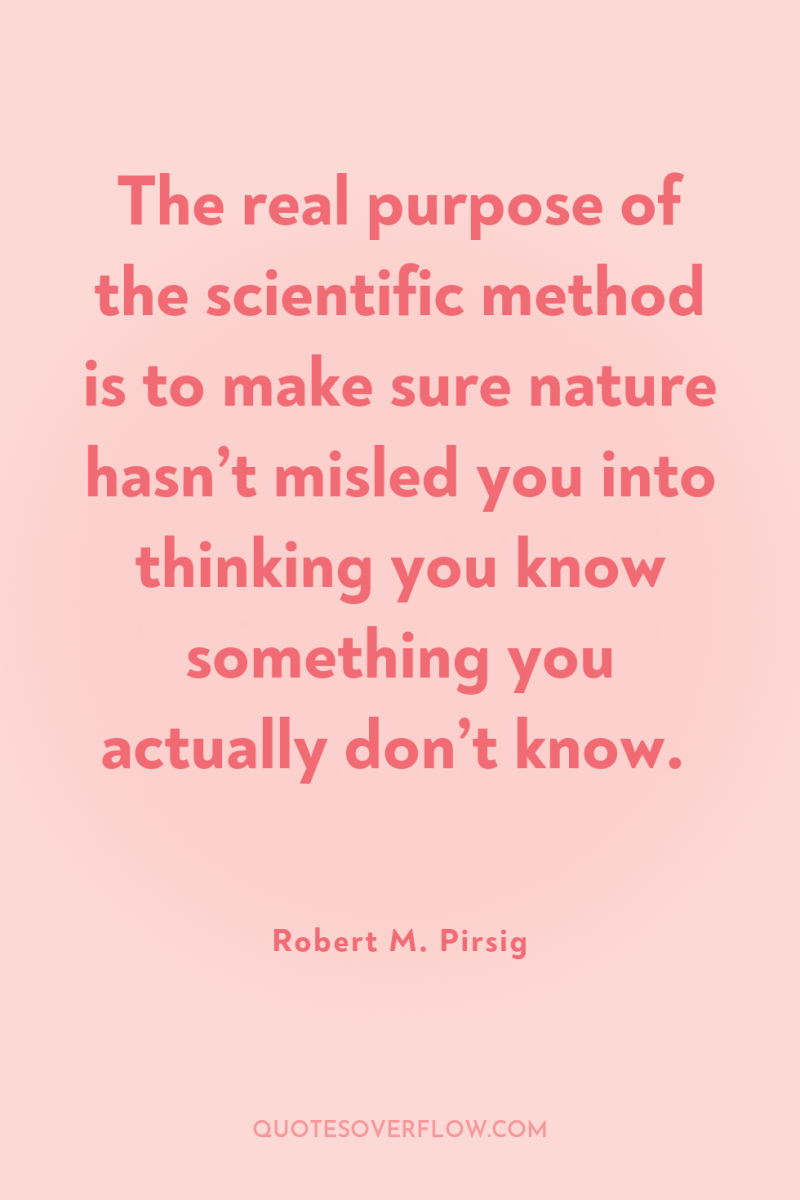
15
The real purpose of the scientific method is to make sure nature hasn’t misled you into thinking you know something you actually don’t know.Robert M. Pirsig
16
The range of human knowledge today is so great that we're all specialists and the distance between specializations has become so great that anyone who seeks to wander freely between them almost has to forego closeness with the people around him.Robert M. Pirsig
17
As a result of his experiments he concluded that imitation was a real evil that had to be broken before real rhetoric teaching could begin. This imitation seemed to be an external compulsion. Little children didn’t have it. It seemed to come later on, possibly as a result of school itself. That sounded right, and the more he thought about it the more right it sounded. Schools teach you to imitate. If you don’t imitate what the teacher wants you get a bad grade. Here, in college, it was more sophisticated, of course; you were supposed to imitate the teacher in such a way as to convince the teacher you were not imitating, but taking the essence of the instruction and going ahead with it on your own. That got you A’s. Originality on the other hand could get you anything — from A to F. The whole grading system cautioned against it.Robert M. Pirsig
18
Grades really cover up failure to teach. A bad instructor can go through an entire quarter leaving absolutely nothing memorable in the minds of his class, curve out the scores on an irrelevant test, and leave the impression that some have learned and some have not. But if the grades are removed the class is forced to wonder each day what it’s really learning. The questions, What’s being taught? What’s the goal? How do the lectures and assignments accomplish the goal? become ominous. The removal of grades exposes a huge and frightening vacuum.Robert M. Pirsig
19
The student’s biggest problem was a slave mentality which had been built into him by years of carrot-and- whip grading, a mule mentality which said, "If you don’t whip me, I won’t work." He didn’t get whipped. He didn’t work. And the cart of civilization, which he supposedly was being trained to pull, was just going to have to creak along a little slower without him. This is a tragedy, however, only if you presume that the cart of civilization, "the system, " is pulled by mules. This is a common, vocational, "location" point of view, but it’s not the Church attitude. The Church attitude is that civilization, or "the system" or "society" or whatever you want to call it, is best served not by mules but by free men. The purpose of abolishing grades and degrees is not to punish mules or to get rid of them but to provide an environment in which that mule can turn into a free man. .Robert M. Pirsig
20
This larger goal wouldn’t be the imitation of education in Universities today, glossed over and concealed by grades and degrees that give the appearance of something happening when, in fact, almost nothing is going on. It would be the real thing.Robert M. Pirsig
21
The fact that they were there as students presumed they did not know what was good or bad. That was his job as instructor...to tell them what was good or bad. The whole idea of individual creativity and expression in the classroom was really basically opposed to the whole idea of the University.Robert M. Pirsig
22
When spontaneity and individuality and really good original stuff occurred in a classroom it was in spite of the instruction, not because of it. This seemed to make sense. He was ready to resign. Teaching dull conformity to hateful students wasn’t what he wanted to do.Robert M. Pirsig
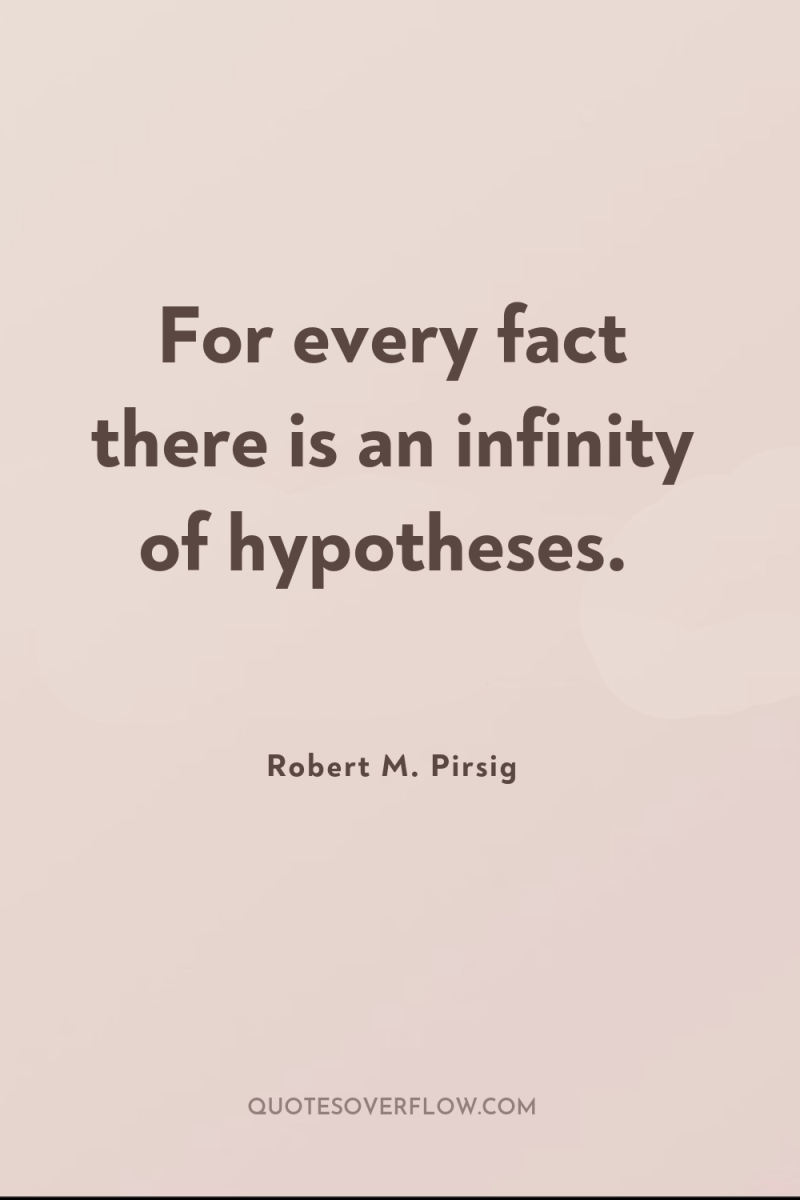
23
For every fact there is an infinity of hypotheses.Robert M. Pirsig
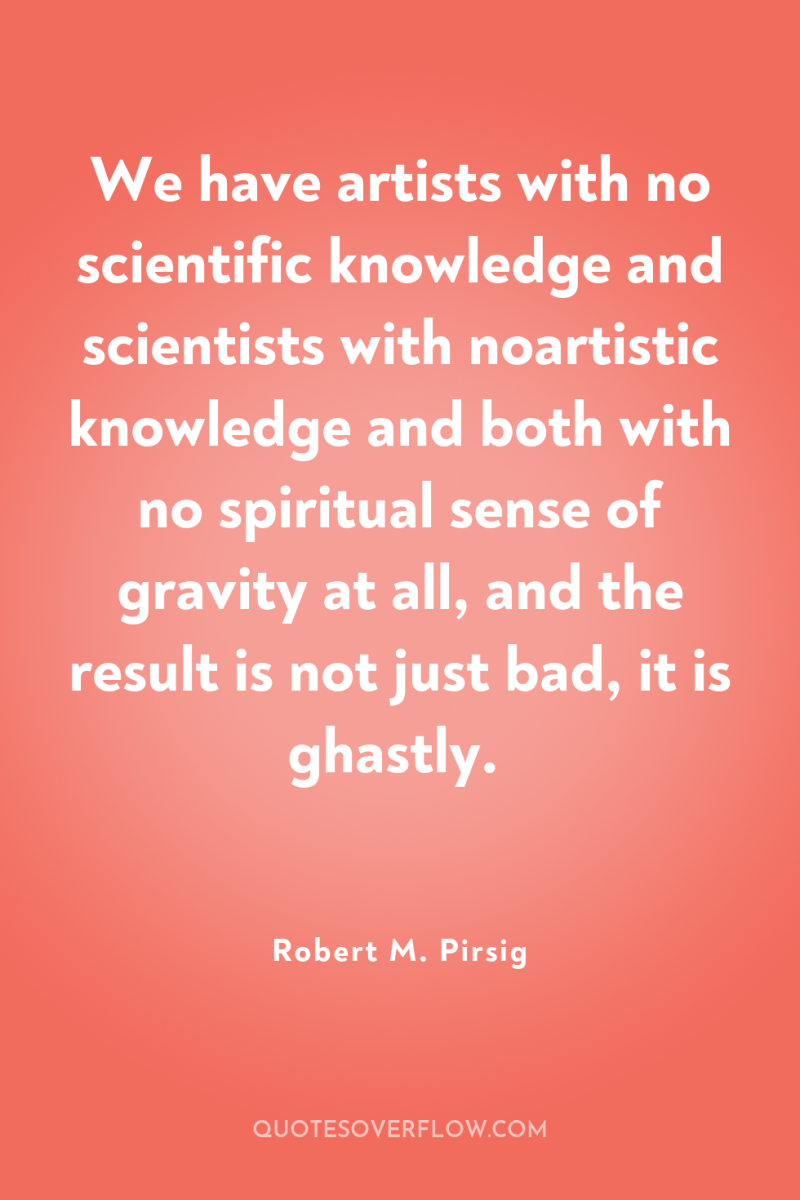
24
We have artists with no scientific knowledge and scientists with noartistic knowledge and both with no spiritual sense of gravity at all, and the result is not just bad, it is ghastly.Robert M. Pirsig
25
The TV scientist who mutters sadly, "The experiment is a failure; we have failed to achieve what we had hoped for, " is suffering mainly from a bad script writer. An experiment is never a failure solely because it fails to achieve predicted results. An experiment is a failure only when it also fails adequately to test the hypothesis in question, when the data it produces don't prove anything one way or another.Robert M. Pirsig
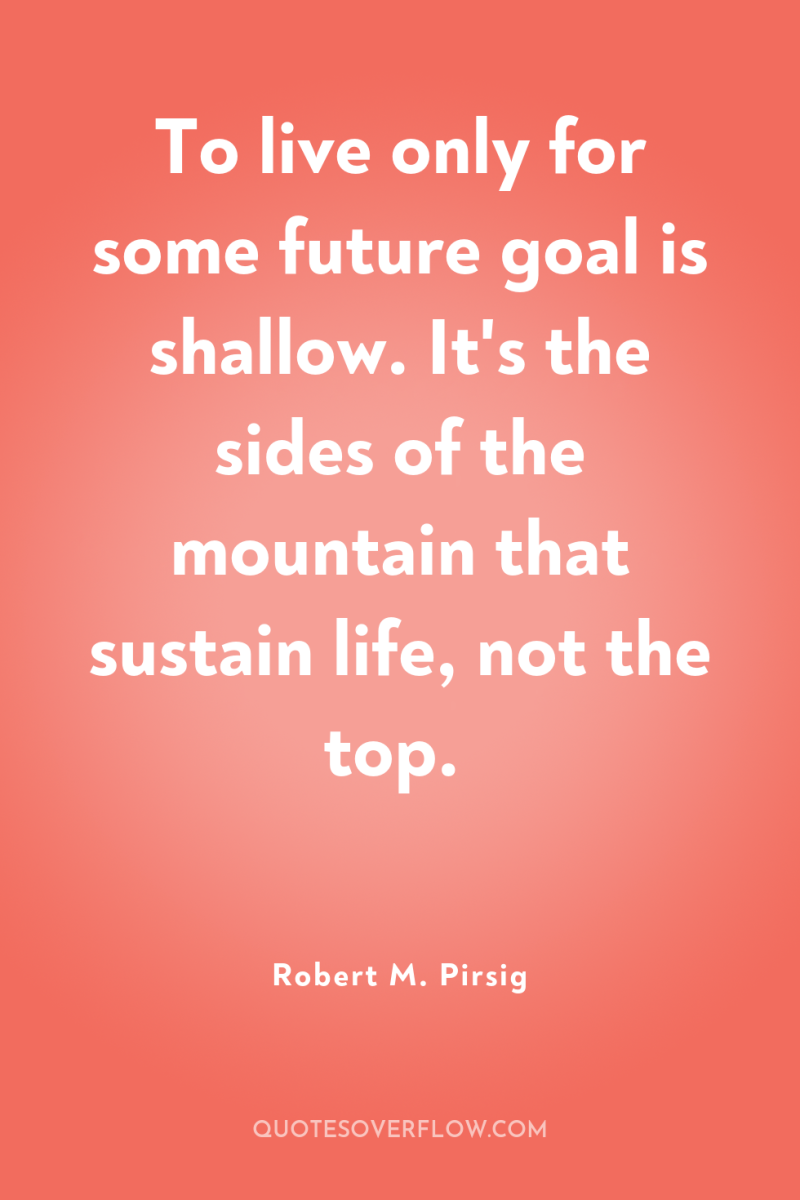
26
To live only for some future goal is shallow. It's the sides of the mountain that sustain life, not the top.Robert M. Pirsig
27
He’d no longer be a grade-motivated person. He’d be a knowledge-motivated person. He would need no external pushing to learn. His push would come from inside. He’d be a free man. He wouldn’t need a lot of discipline to shape him up. In fact, if the instructors assigned him were slacking on the job he would be likely to shape them up by asking rude questions. He’d be there to learn something, would be paying to learn something and they’d better come up with it. Motivation of this sort, once it catches hold, is a ferocious force..Robert M. Pirsig
28
Now we’ve a real intellectual impasse. Our reason, which is supposed to make things more intelligible, seems to be making them less intelligible, and when reason thus defeats its own purpose something has to be changed in the structure of our reason itself.Robert M. Pirsig
29
You can’t really think hard about what you’re doing and listen to the radio at the same time. Maybe they didn’t see their job as having anything to do with hard thought, just wrench twiddling.Robert M. Pirsig
30
I don’t know why–it’s just that– I don’t know–they’re not kin."– Surprising word, I think to myself never used it before. Not of kin–sounds like hillbilly talk–not of a kind–same root–kindness, too–they can’t have real kindness toward him, they’re not his kin --. That’s exactly the feeling. Old word, so ancient it’s almost drowned out. What a change through the centuries. Now anybody can be "kind." And everybody’s supposed to be. Except that long ago it was something you were born into and couldn’t help. Now it’s just a faked-up attitude half the time, like teachers the first day of class. But what do they really know about kindness who are not kin.Robert M. Pirsig
31
But the ones who go posing as moralists are the worst. Cost-free morals. Full of great ways for others to improve without any expense to themselves. There's an ego thing in there, too. They use the morals to make someone else look inferior and that way look better themselves. It doesn't matter what the moral code is -- religious morals, political morals, racist morals, capitalist morals, feminist morals, hippie morals -- they're all the same. The moral codes change but the meanness and the egotism stay the same. .Robert M. Pirsig
32
The application of this knife, the division of the world into parts and the building of this structure, is something everybody does. All the time we are aware of millions of things around us - these changing shapes, these burning hills, the sound of the engine, the feel of the throttle, each rock and weed and fence post and piece of debris beside the road - aware of these things but not really conscious of them unless there is something unusual or unless they reflect something we are predisposed to see. We could not possibly be conscious of these things and remember all of them because our mind would be so full of useless details we would be unable to think. From all this awareness we must select, and what we select and calls consciousness is never the same as the awareness because the process of selection mutates it. We take a handful of sand from the endless landscape of awareness around us and call that handful of sand the world." -Zen and the Art of Motorcycle Maintenance .Robert M. Pirsig
33
One of the most moral acts is to create a space in which life can move forward.Robert M. Pirsig
34
For every fact there is an infinity of hypotheses. The more you look the more you see.Robert M. Pirsig
35
Who really can face the future? All you can do is project from the past, even when the past shows that such projections are often wrong. And who really can forget the past? What else is there to know?Robert M. Pirsig
36
Definitions are the foundation of reason. You can’t reason without them.Robert M. Pirsig
37
To doubt the literal meaning of the words of Jesus or Moses incurs hostility from most people, but it’s just a fact that if Jesus or Moses were to appear today, unidentified, with the same message he spoke many years ago, his mental stability would be challenged. This isn’t because what Jesus or Moses said was untrue or because modern society is in error but simply because the route they chose to reveal to others has lost relevance and comprehensibility. "Heaven above" fades from meaning when space-age consciousness asks, Where is "above"? But the fact that the old routes have tended, because of language rigidity, to lose their everyday meaning and become almost closed doesn’t mean that the mountain is no longer there. It’s there and will be there as long as consciousness exists. .Robert M. Pirsig
38
Bouncing on beds, I remember from childhood, is a great depression reliever.Robert M. Pirsig
39
The orange turns to dull bronze light and continues to show what it has shown all day long, but now it seems to show it without enthusiasm. Across those dry hills, within those little houses in the distance are people who've been there all day long, going about the business of the day, who now find nothing unusual or different in this strange darkening landscape, as we do. If we were to come upon them early in the day they might be curious about us and what we're here for. but now in the evening they'd just resent our presence. The workday is over. It's time for supper and family and relaxation and turning inward at home. We ride unnoticed down this empty highway through this strange country I've never seen before, and now a heavy feeling of isolation and loneliness becomes dominant and my spirits wane with the sun. .Robert M. Pirsig
40
He singled out aspects of Quality such as unity, vividness, authority, economy, sensitivity, clarity, emphasis, flow, suspense, brilliance, precision, proportion, depth and so on; kept each of these as poorly defined as Quality itself, but demonstrated them by the same class reading techniques. He showed how the aspect of Quality called unity, the hanging-togetherness of a story, could be improved with a technique called an outline. The authority of an argument could be jacked up with a technique called footnotes, which gives authoritative reference. Outlines and footnotes are standard things taught in all freshman composition classes, but now as devices for improving Quality they had a purpose. And if a student turned in a bunch of dumb references or a sloppy outline that showed he was just fulfilling an assignment by rote, he could be told that while his paper may have fulfilled the letter of the assignment it obviously didn’t fulfill the goal of Quality, and was therefore worthless.Robert M. Pirsig
41
Bill arrives with a grin about something. Sure, he's got some jets for my machine and knows right were they are. I'll have to wait a second though. He's got to close a deal out in back on some Harley parts. I go with him out in a shed in back and see he is selling a whole Harley machine in used parts, except for the frame, which the customer already has. He is selling them all for $125. Not a bad price at all. Coming back I comment, "He'll know something about motorcycles before he gets those together." Bill laughs. "And that's the best way to learn, too.Robert M. Pirsig
42
Mountains should be climbed with as little effort as possible and without desire. The reality of your own nature should determine the speed. If you become restless, speed up. If you become winded, slow down. You climb the mountain in an equilibrium between restlessness and exhaustion. Then, when you’re no longer thinking ahead, each footstep isn’t just a means to an end but a unique event in itself. This leaf has jagged edges. This rock looks loose. From this place the snow is less visible, even though closer. These are things you should notice anyway. To live only for some future goal is shallow. It’s the sides of the mountain which sustain life, not the top. Here’s where things grow. But of course, without the top you can’t have any sides. It’s the top that defines the sides. So on we go–we have a long way–no hurry–just one step after the next–with a little Chautauqua for entertainment -- .Mental reflection is so much more interesting than TV it’s a shame more people don’t switch over to it. They probably think what they hear is unimportant but it never is.Robert M. Pirsig
43
I want to talk about another kind of high country now in the world of thought, which in some ways, for me at least, seems to parallel or produce feelings similar to this, and call it the high country of the mind. If all of human knowledge, everything that’s known, is believed to be an enormous hierarchic structure, then the high country of the mind is found at the uppermost reaches of this structure in the most general, the most abstract considerations of all. Few people travel here. There’s no real profit to be made from wandering through it, yet like this high country of the material world all around us, it has its own austere beauty that to some people makes the hardships of traveling through it seem worthwhile. In the high country of the mind one has to become adjusted to the thinner air of uncertainty, and to the enormous magnitude of questions asked, and to the answers proposed to these questions. The sweep goes on and on and on so obviously much further than the mind can grasp one hesitates even to go near for fear of getting lost in them and never finding one’s way out.Robert M. Pirsig
44
The real ugliness lies in the relationship between people who produce the technology and the things they produce, which results in a similar relationship between the people who use the technology and the things they use.Robert M. Pirsig
45
Our current modes of rationality are not moving society forward into a better world. They are taking it further and further from that better world. Since the Renaissance these modes have worked. As long as the need for food, clothing and shelter is dominant they will continue to work. But now that for huge masses of people these needs no longer overwhelm everything else, the whole structure of reason, handed down to us from ancient times, is no longer adequate. It begins to be seen for what it really is..emotionally hollow, esthetically meaningless and spiritually empty. That, today, is where it is at, and will continue to be at for a long time to come. .Robert M. Pirsig
46
Now anybody can be "kind." And everybody's supposed to be. Except that long ago it was something you were born into and couldn't help. Now it's just a faked-up attitude half the time, like teachers the first day of class.Robert M. Pirsig
47
We want to make good time, but for us now this is measured with the emphasis on "good" rather than on "time"....Robert M. Pirsig
48
People entered the park and became polite and cozy and fakey to each other because the atmosphere of the park made them that way. In the entire time he had lived within a hundred miles of it he had visited it only once or twice.Robert M. Pirsig
49
I wake up wondering if I know we're near mountains because of memory or because of something in the air.Robert M. Pirsig
50
So we navigate mostly by dead reckoning, and deduction from what clues we find. I keep a compass in one pocket for overcast days when the sun doesn't show directions and have the map mounted in a special carrier on top of the gas tank where I can keep track of miles from the last junction and know what to look for. With those tools and a lack of pressure to 'get somewhere' it works out fine and we just about have America all to ourselves.Robert M. Pirsig
51
What’s emerging from the pattern of my own life is the for belief that the crisis is being caused by the inadequacy of existing forms of thought to cope with the situation. It can’t be solved by rational means because the rationality itself is the source of the problem. The only ones who’re solving it are solving it at a personal level by abandoning ‘square’ rationality altogether and going by feelings alone. Like John and Sylvia here. And millions of others like them. And that seems like a wrong direction too. So I guess what I’m trying to say is that the solution to the problem isn’t that you abandon rationality but that you expand the nature of rationality so that it’s capable of coming up with a solution. .Robert M. Pirsig
52
The truths Phaedrus began to pursue were lateral truths; no longer the frontal truths of science, those toward which the discipline pointed, but the kind of truth you see laterally, out of the corner of your eye. In a laboratory situation, when your whole procedure goes haywire, when everything goes wrong or is indeterminate or is so screwed up by unexpected results you can't make head or tail out of anything, you start looking laterally. That's a word he later used to describe a growth of knowledge that doesn't move forward like an arrow in flight, but expands sideways, like an arrow enlarging in flight, or like the archer, discovering that although he has hit the bull's-eye and won the prize, his head is on a pillow and the sun is coming in the window. Lateral knowledge is knowledge that's from a wholly unexpected direction, from a direction that's not even understood as a direction until the knowledge forces itself upon one. Lateral truths point to the falseness of axioms and postulates underlying one's existing system of getting at truth.Robert M. Pirsig
53
Once they got into the idea of seeing directly for themselves they also saw there was no limit to the amount they could say. It was a confidence building assignment too, because what they wrote, even though seemingly trivial, was nevertheless their own thing, not a mimicking of someone else’s.Robert M. Pirsig
54
His early failure had released him from any felt obligation to think along institutional lines and his thoughts were already independent to a degree few people are familiar with. He felt that institutions such as schools, churches, governments and political organizations of every sort all tended to direct thought for ends other than truth, for the perpetuation of their own functions, and for the control of individuals in the service of these functions. He came to see his early failure as a lucky break, an accidental escape from a trap that had been set for him, and he was very trap-wary about institutional truths for the remainder of his time.Robert M. Pirsig
55
Like trying to keep a fatman out of the refrigerator. 'LilaRobert M. Pirsig
56
My favorite cure for boredom is sleep. It's very easy to get to sleep when bored and very hard to get bored after a long rest.Robert M. Pirsig
57
She was strangely unaware that she could look and see freshly for herself, as she wrote, without primary regard for what had been said before.Robert M. Pirsig
58
People spend their entire lives at those lower altitudes without any awareness that this high country exists.Robert M. Pirsig
59
What is in mind is a sort of Chautauqua..that’s the only name I can think of for it..like the traveling tent-show Chautauquas that used to move across America, this America, the one that we are now in, an old-time series of popular talks intended to edify and entertain, improve the mind and bring culture and enlightenment to the ears and thoughts of the hearer. The Chautauquas were pushed aside by faster-paced radio, movies and TV, and it seems to me the change was not entirely an improvement. Perhaps because of these changes the stream of national consciousness moves faster now, and is broader, but it seems to run less deep. The old channels cannot contain it and in its search for new ones there seems to be growing havoc and destruction along its banks. In this Chautauqua I would like not to cut any new channels of consciousness but simply dig deeper into old ones that have become silted in with the debris of thoughts grown stale and platitudes too often repeated.Robert M. Pirsig
60
But the biggest clue seemed to be their expressions. They were hard to explain. Good-natured, friendly, easygoing..and uninvolved. They were like spectators. You had the feeling they had just wandered in there themselves and somebody had handed them a wrench. There was no identification with the job. No saying, "I am a mechanic." At 5 P.M. or whenever their eight hours were in, you knew they would cut it off and not have another thought about their work. They were already trying not to have any thoughts about their work on the job.Robert M. Pirsig
61
I am a pioneer now, looking onto a promised land.Robert M. Pirsig
62
If you can’t define something you have no formal rational way of knowing that it exists. Neither can you really tell anyone else what it is. There is, in fact, no formal difference between inability to define and stupidity.Robert M. Pirsig
63
He comments on how amazing it is that everything in the universe can be described by the twenty-six written characters with which they have been working.Robert M. Pirsig
64
He comments on how amazing it is that everything in the universe can be described by the twenty-six written characters with which they have been working. His (Korean) friends nod and smile and eat the food they've taken from tins and say no pleasantly.Robert M. Pirsig
65
Dad?""What?" A small bird rises from a tree in front of us." What should I be when I grow up?" The bird disappears over a far ridge. I don't know what to say. "Honest, " I finally say.Robert M. Pirsig
66
This forest silence improves anyone.Robert M. Pirsig
67
Phædrus wrote a letter from India about a pilgrimage to holy Mount Kailas, the source of the Ganges and the abode of Shiva, high in the Himalayas, in the company of a holy man and his adherents. He never reached the mountain. After the third day he gave up, exhausted, and the pilgrimage went on without him. He said he had the physical strength but that physical strength wasn’t enough. He had the intellectual motivation but that wasn’t enough either. He didn’t think he had been arrogant but thought that he was undertaking the pilgrimage to broaden his experience, to gain understanding for himself. He was trying to use the mountain for his own purposes and the pilgrimage too. He regarded himself as the fixed entity, not the pilgrimage or the mountain, and thus wasn’t ready for it. He speculated that the other pilgrims, the ones who reached the mountain, probably sensed the holiness of the mountain so intensely that each footstep was an act of devotion, an act of submission to this holiness. The holiness of the mountain infused into their own spirits enabled them to endure far more than anything he, with his greater physical strength, could take. .Robert M. Pirsig
68
During periods of root expansion things have always looked as confused and topsy-turvy and purposeless as they do now. The whole Renaissance is supposed to have resulted from the topsy-turvy feeling caused by Columbus’ discovery of a new world. It just shook people up. The topsy-turviness of that time is recorded everywhere. There was nothing in the flat-earth views of the Old and New Testaments that predicted it. Yet people couldn’t deny it. The only way they could assimilate it was to abandon the entire medieval outlook and enter into a new expansion of reason. .Robert M. Pirsig
69
We’re living in topsy-turvy times, and I think that what causes the topsy-turvy feeling is inadequacy of old forms of thought to deal with new experiences. I’ve heard it said that the only real learning results from hang-ups, where instead of expanding the branches of what you already know, you have to stop and drift laterally for a while until you come across something that allows you to expand the roots of what you already know. Everyone’s familiar with that. I think the same thing occurs with whole civilizations when expansion’s needed at the roots. .Robert M. Pirsig
70
When you want to hurry something, that means you no longer care about it and want to get on to other things. I just want to get at it slowly, but carefully and thoroughly, with the same attitude I remember was present just before I found that sheared pin. It was that attitude that found it, nothing else.Robert M. Pirsig
71
Technology presumes there’s just one right way to do things and there never is. And when you presume there’s just one right way to do things, of course the instructions begin and end exclusively with the rotisserie. But if you have to choose among an infinite number of ways to put it together then the relation of the machine to you, and the relation of the machine and you to the rest of the world, has to be considered, because the selection from many choices, the art of the work is just as dependent upon your own mind and spirit as it is upon the material of the machine. That’s why you need the peace of mind. .Robert M. Pirsig
72
To some extent the romantic condemnation of rationality stems from the very effectiveness of rationality in uplifting men from primitive conditions.Robert M. Pirsig
73
And what is written well and what is written badly...need we ask Lysias or any other poet or orator who ever wrote or will write either a political or other work, in meter or out of meter, poet or prose writer, to teach us this?" What is good, PhÃÅdrus, and what is not good...need we ask anyone to tell us these things?Robert M. Pirsig
74
What he’s looking for, what he wants, is all around him, but he doesn’t want that because it is all around him. Every step’s an effort, both physically and spiritually, because he imagines his goal to be external and distant.Robert M. Pirsig
75
Actually I've never seen a cycle-maintenance problem complex enough really to require full-scale formal scientific method. Repair problems are not that hard. When I think of formal scientific method an image sometimes comes to mind of an enormous juggernaut, a huge bulldozer-slow, tedious, lumbering, laborious, but invincible. It takes twice as long, five times as long, maybe a dozen times as long as informal mechanic's techniques, but you know in the end you're going to get it. There's no fault isolation problem in motorcycle maintenance that can stand up to it. When you've hit a really tough one, tried everything, racked your brain and nothing works, and you know that this time Nature has really decided to be difficult, you say, "Okay, Nature, that's the end of the nice guy, " and you crank up the formal scientific method.Robert M. Pirsig
76
Not everyone understands what a completely rational process this is, this maintenance of a motorcycle. They think it's some kind of "knack" or some kind of "affinity for machines" in operation. They are right, but the knack is almost purely a process of reason, and most of the troubles are caused by what old time radio men called a "short between the earphones, " failures to use the head properly. A motorcycle functions entirely in accordance with the laws of reason, and a study of the art of motorcycle maintenance is really a miniature study of the art of rationality itself. .Robert M. Pirsig
77
The test of the machine is the satisfaction it gives you. There isn't any other test. If the machine produces tranquility it's right. If it disturbs you it's wrong until either the machine or your mind is changed.Robert M. Pirsig
78
This condemnation of technology is ingratitude, that's what it is. Blind alley, though. If someone's ungrateful and you tell him he's ungrateful, okay, you've called him a name. You haven't solved anything.Robert M. Pirsig
79
When analytic thought, the knife, is applied to experience, something is always killed in the process.Robert M. Pirsig
80
Grades really cover up failure to teach.Robert M. Pirsig
81
Can I have a motorcycle when I get old enough?"" If you take care of it."" What do you have to do?"" Lot's of things. You've been watching me."" Will you show me all of them?"" Sure."" Is it hard?"" Not if you have the right attitudes. It's having the right attitudes that's hard."" Oh." After a while I see he is sitting down again. Then he says, "Dad?""What?""Will I have the right attitudes?"" I think so, " I say. "I don't think that will be any problem at all.Robert M. Pirsig
82
Newton invented a new form of reason. He expanded reason to handle infinitesimal changes and I think what is needed now is a similar expansion of reason to handle technological ugliness. The trouble is that the expansion has to be made at the roots, not at the branches, and that’s what makes it hard to see.Robert M. Pirsig
83
But until then, and right now, the sun is bright, the air is cool, my head is clear, there’s a whole day ahead of us, we’re almost to the mountains, it’s a good day to be alive. It’s this thinner air that does it. You always feel like this when you start getting into higher altitudes.Robert M. Pirsig
84
Mountains like these and travelers in the mountains and events that happen to them here are found not only in Zen literature but in the tales of every major religion. This allegory of a physical mountain for the spiritual one that stands between each soul and its goal is an easy and natural one to make. Like those in the valley behind us, most people stand in sight of the spiritual mountains all their lives and never enter them, being content to listen to others who have been there and thus avoid the hardships. Some travel into the mountains accompanied by experienced guides who know the best and least dangerous routes by which they arrive at their destination. Still others, inexperienced and untrusting, attempt to make their own routes. Few of these are successful, but occasionally some, by sheer will and luck and grace, do make it. Once there they become more aware than any of the others that there's no single or fixed number of routes. There are as many routes as there are individual souls.Robert M. Pirsig
85
The title of this Chautauqua is "Zen and the Art of Motorcycle Maintenance, " not "Zen and the Art of Mountain Climbing, " and there are no motorcycles on the tops of mountains, and in my opinion very little Zen. Zen is the "spirit of the valley, " not the mountaintop. The only Zen you fin on the tops of mountains is the Zen you bring up there.Robert M. Pirsig
86
Mountains should be climbed with as little effort as possible and without desire. The reality of your own nature should determine the speed. If you become restless, speed up. If you become winded, slow down. You climb the mountain in an equilibrium between restlessness and exhaustion.Robert M. Pirsig
87
You’ve got to live right, too. It’s the way you live that predisposes you to avoid the traps and see the right facts. You want to know how to paint a perfect painting? It’s easy. Make yourself perfect and then just paint naturally. That’s the way all the experts do it. The making of a painting or the fixing of a motorcycle isn’t separate from the rest of your existence. If you’re a sloppy thinker the six days of the week you aren’t working on your machine, what trap avoidance, what gimmicks, can make you all of a sudden sharp on the seventh? It all goes together .. The real cycle you're working in is a cycle called yourself. The machine that appears to be "out there" and the person that appears to be "in here" are not two separate things. They grow toward Qaulity or fall away from Qaulity together. .Robert M. Pirsig
88
An egoless acceptance of stuckness is a key to an understanding of all Quality.Robert M. Pirsig
89
The bones and flesh and legal statistics are the garments worn by the personality, not the other way around.Robert M. Pirsig
90
There is no perfectly shaped part of the motorcycle and never will be, but when you come as close as these instruments take you, remarkable things happen, and you go flying across the countryside under a power that would be called magic if it were not so completely rational in every way.Robert M. Pirsig
91
The machine itself receives some of the same feelings. With over 27, 000 on it it's getting to be something of a high-miler, and old-timer, although there are plenty of older ones running. But over the miles, and I think most cyclists will agree with this, you pick up certain feelings about an individual machine that are unique for that one individual machine and no other. A friend who owns a cycle of the same make, model and even same year brought it over for a repair, and when I test rode it afterward it was hard to believe it had come from the same factory years ago. You could see that long ago it had settled into its own kind of feel and ride and sound, completely different from mine. No worse, but different. I suppose you could call that a personality. Each machine has its own, unique personality which probably could be defined as the intuitive sum total of everything you know and feel about it. This personality constantly changes, usually for the worse, but sometimes surprisingly for the better, and it is the personality that is the real object of motorcycle maintenance. The new ones start out as good-looking strangers, and depending on how they are treated, degenerate rapidly into bad-acting grouches or even cripples, or else turn into healthy, good-natured, long-lasting friends. .Robert M. Pirsig
92
You look at these mountains now, and they look so permanent and peaceful, but they're changing all the time and the changes aren't always peaceful. Underneath us, beneath us here right now, there are forces that can tear this whole mountain apart.Robert M. Pirsig
93
When you have mountains in the distance or even hills, you have space.Robert M. Pirsig
94
The real purpose of the scientific method is to make sure Nature hasn't misled you into thinking you know something you don't actually know. There's not a mechanic or scientist or technician alive who hasn't suffered from that one so much that he's not instinctively on guard. That's the main reason why so much scientific and mechanical information sounds so dull and so cautious. If you get careless or go romanticizing scientific information, give it a flourish here and there, Nature will soon make a complete fool out of you. It does it often enough anyway even when you don't give it opportunities. One must be extremely careful and rigidly logical when dealing with Nature: one logical slip and an entire scientific edifice comes tumbling down. One false deduction about the machine and you can get hung up indefinitely. .Robert M. Pirsig
95
Pretty mountains, pretty river, bumpy but pleasant tar road... old buildings, old people on a front porch... strange how old, obsolete buildings and plants and mills, the technology of fifty and a hundred years ago, always seem to look so much better than the new stuff.Robert M. Pirsig
96
I talked yesterday about caring, I care about these moldy old riding gloves. I smile at them flying through the breeze beside me because they have been there for so many years and are so old and so tired and so rotten there is something kind of humorous about them. They have become filled with oil and sweat and dirt and spattered bugs and now when I set them down flat on a table, even when they are not cold, they won't stay flat. They've got a memory of their own. They cost only three dollars and have been restitched so many times it is getting impossible to repair them, yet I take a lot of time and pains to do it anyway because I can't imagine any new pair taking their place. That is impractical, but practicality isn't the whole thing with gloves or with anything else.Robert M. Pirsig
97
Coastal people never really know what the ocean symbolizes to landlocked inland people–what a great distant dream it is, present but unseen in the deepest levels of subconsciousness, and when they arrive at the ocean and the conscious images are compared with the subconscious dream there is a sense of defeat at having come so far to be so stopped by the mystery that can never be fathomed. The source of it all.Robert M. Pirsig
98
This is the hardest stuff in the world to photograph. You need a three-hundred-and-sixty-degree lens, or something. You see it, and then you look down in the ground glass and it's just nothing. As soon as you put a border on it, it's gone.Robert M. Pirsig
99
Or winters when the sloughs were frozen over and dead and i could walk across the ice and snow between the dead cattails and see nothing but grey skies and dead things and coldRobert M. Pirsig
100
A slave mentality which had been built into him by years of carrot-and-whip grading, a mule mentality which said, “If you don’t whip me, I won’t work.” He didn’t get whipped. He didn’t work.Robert M. Pirsig